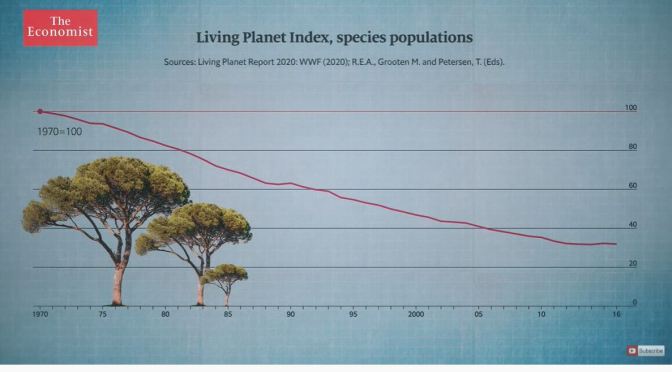Climate change has made extreme rainfall events of the kind that sent lethal torrents of waterhurtling through parts of Germany and Belgium last month at least 20% more likely to happen in the region, according to an international study published Tuesday (August 24).
Tag Archives: Climate Change
Interview: Bill Gates Will Commit $1.5B To Congress’ Enacted Climate Projects
Bill Gates’s investment fund will pledge $1.5 billion for climate projects if Congress enacts an infrastructure bill. The Microsoft co-founder and Energy Secretary Jennifer Granholm told the WSJ how public-private partnerships can spur innovation. Photo: Bill Gates via WSJ
Ecology: Scientists Breed Plants With Fast-Growing Roots To Revitalize Land
Humanity faces major challenges. Could roots hold the answers? It’s possible: Research shows that roots have the potential to provide food for the world’s population, stop climate change and help extract resources in an environmentally friendly way. Plants must withstand periods of drought and heat, as well as flooding, and they use their roots to do this. Roots also help them actively search for nutrients in the soil, while warding off dangers such as pathogens and toxins.
Now, scientists at the research institute Forschungszentrum Jülich are investigating root growth using high-tech methods. The goal is to breed stress-resistant seeds for plants with robust roots. They are not alone: In Sweden, Professor Linda Maria Mårtensson is conducting research on a perennial wheat variety that will ensure higher yields while protecting the soil. Along the world’s coasts, too, roots are a lifesaver.
Coastal ecologist Professor Tjeerd Bouma has discovered that if special grasses are planted in front of dikes, they create a salt marsh that acts as a natural breakwater. Meanwhile, geochemist Dr. Oliver Wiche of the Technical University of Freiberg is researching something known as “phytomining.” He wants to know which plants are best suited for mining metals from the soil. Could this root research give rise to a new, environmentally friendly branch of industry?
Climate: What Is ‘Net Zero’?
More than 50 countries around the world have pledged to become net zero. But what does net zero actually mean—and is it achievable?
Morning News: Crisis In Tunisia, Vatican Trial, Climate-Changed Wine
The president has sacked the prime minister and suspended parliament. It is clear that the country needed a shake-up in its hidebound politics—but is this the right way?
A sprawling trial starting today involving the most senior Catholic-church official ever indicted is sure to cast light on the Vatican’s murky finances. And how climate change is already changing winemaking.
Ocean Science: Can Kelp Forests Survive Climate Change, Trawler Fishing
Kelp locks up millions of tonnes of carbon globally, provides a nursery for fish and is a buffer against coastal flooding. But climate change, weather and fishing are taking their toll. Now, Mika Peck and his team at the University of Sussex are monitoring kelp off the south coast of the UK, to see if it can recover from the damage done to it by trawling and help improve biodiversity in the area.
Morning News: What A 3° Warmer World Looks Like, Sudan & Liverpool Let Go
It seems ever more certain that global temperatures will sail past limits set in the Paris Agreement. We examine what a world warmed by 3°C would—or will—look like.
Our correspondent speaks with Sudan’s three most powerful men; will they act in concert or in conflict on the way to democracy? And why Liverpool has been booted from UNESCO’s world-heritage list
Analysis: The Western U.S. Drought’s Major Impacts
Watering the Country’s Food Basket Is Becoming a Challenge
Droughts are part of a natural cycle of water. But the drought currently gripping the Western U.S. has climate scientists concerned that the cycle may be shifting. This has major implications for those who rely on the water the most: farmers and the communities they surround. Photo Illustration: Carter McCall/WSJ
Science: Avoiding Sudden Food Scarcity, Lattice Strength, Time Neurons
Addressing the problem of sudden food scarcity in US cities, and the up-and-coming field of computational social science.
In this episode:
00:45 Food shocks
Climate change, the COVID-19 pandemic, and geopolitical crises can cause food shortages. To tackle this issue, Alfonso Mejia and colleagues have modelled how to best mitigate these food shocks in US cities. Alfonso tells us about the new analyses and what steps cities could take in the future.
Research Article: Gomez et al.
News and Views: How to buffer against an urban food shortage
06:07 Research Highlights
A tiny lattice can withstand the impacts of projectiles at twice the speed of sound, and the neurons that allow humans to perceive time.
Research Highlight: Supersonic strikes leave just a dent in this super-light material
Research Highlight: The ‘time neurons’ that help the brain keep track
08:25 Computational Social Science
Big data is transforming research, and social science is no exception. This week, Nature is running a special issue on ‘computational social science’. We catch up with some of the editors involved to find out more about this up-and-coming field.
Collections: Computational Social Science
19:27 Briefing Chat
We discuss some highlights from the Nature Briefing. This time, discovering the dazzling diversity of viruses, and how China eradicated malaria.
Nature News Feature: Beyond coronavirus: the virus discoveries transforming biology
Ecosystems: How To Stop Mass Extinction Of Species
The world’s animals and wildlife are becoming extinct at a greater rate than at any time in human history. Could technology help to save threatened species? Read our latest technology quarterly on protecting biodiversity: https://econ.st/3dqdkKN










